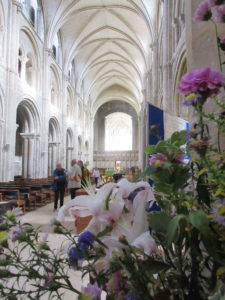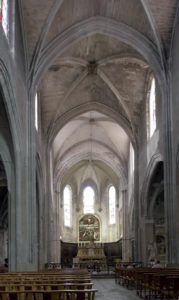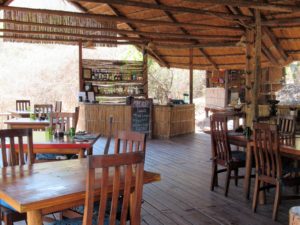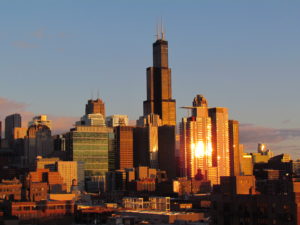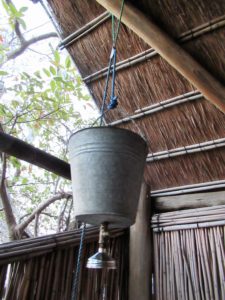“Mumbo Island”:http://www.mumboisland.com/, our second stop on Lake Malawi, is deserted apart from five tent-style lodges owned by Kayak Africa. There’s no electricity at this eco-lodge, except for solar generated power for the radio system.
After a 45-minute boat trip from Cape Maclear, we were met by a waving, welcoming committee. Norah, the manager, took us to our tent (5), a 10-minute walk from the main lodge which involved negotiating: a narrow path carefully avoiding rocks, branches and tree roots; wooden decking (including a steep section round a bend); steps; a wobbly bridge and finally, a sandy incline. Although solar lights were hung at strategic intervals at night, torches were essential, as was keeping our mouths shut to avoid eating the flies attracted by the lights.
The tents were well-spaced for privacy and set high above the lake. The wooden deck had cane chairs and a hammock and the nearby trees were a magnet for birds and small reptiles, particularly first thing in the morning. Inside the tent were two single beds pushed together, which were draped in a huge turquoise mosquito net, bedside cabinets, small coffee table and hanging rack. Filtered water was provided in flasks and all the glasses used were cut down wine or beer bottles.
The exterior bathroom involved negotiating a couple of steps and a narrow pathway: needless to say, we went together at night. The eco-loo was a clever affair; a normal porcelain loo with a long drop, into which you added a scoop of wooden chips from a basket once you’d finished. The waste is collected in a sealed box which promotes rapid drying and partial decomposition using the sun’s energy. It’s then transported back to the mainland, where it’s buried in pits for the decomposition to complete. After a year, it’s used for tree planting projects.
The shower was a bucket affair: you ordered a delivery of hot water which was put in the metal shower bucket along with cold water from the tap to mix. Once the right temperature was achieved, the bucket was hoisted up using a pulley and rope, and you used the shower attachment underneath the bucket to regulate the flow of water. There was enough water in one bucket for two decent showers and it was a practical way of showering. The shower floor was reeds, so the water drained naturally through. There was a small basin with a cold tap and a cane rack for toiletries and towels.
The main lodge had the bar, dining area and lounge with a selection of books and games. A star-gazing area had a fire-pit, but it wasn’t lit on the two nights we were there. The dining area had a constant help-yourself supply of tea, coffee, squash, water, biscuits and nuts.
The beach was in a small bay and the water clear, turquoise and clean and we were soon out in the deep water. A thatched hut had kayaks and snorkelling equipment and there was a series of short hikes across the small island.
A sundowner cruise was included and it was just the two of us along with the skipper sailing gently around the island and getting into position for the setting of the sun at around 5.30pm over a pre-ordered Malawi Gin and Tonic, nuts and biscuits.
The no-choice meals were delicious and we were beckoned by the croak of a wooden frog! Dinner on our first night was cheese straws and tomato salsa for starters, a serve-yourself main of thinly sliced, tender beef, roast potatoes, broccoli and cauliflower with gravy followed by carrot cake with Amarula cream.
By 8pm dinner was over and it was very dark. We had an early night but were up with the lark to watch sunrise from our deck and await an early morning delivery of tea.
Breakfasts were serve-yourself fruit, cereal and juice followed by eggs of your choice and sides which varied daily. During breakfast a plethora of small birds waited eagerly in the wings for crumbs.
Lunch at 1pm was a buffet: something like summer pasta in a tomato sauce and crumbled feta, with carrot salad and rolls followed by banana fritters.
Mumbo is a no-cash island and the tab for drinks and items from the small curio shop are settled back on the mainland reception on return. Tips of $3 to $5 per person per night are suggested, which are distributed to all staff using an agreed system.
We had no idea what to expect from this eco-lodge, but we found our two nights were very enjoyable and a great place to switch off.
